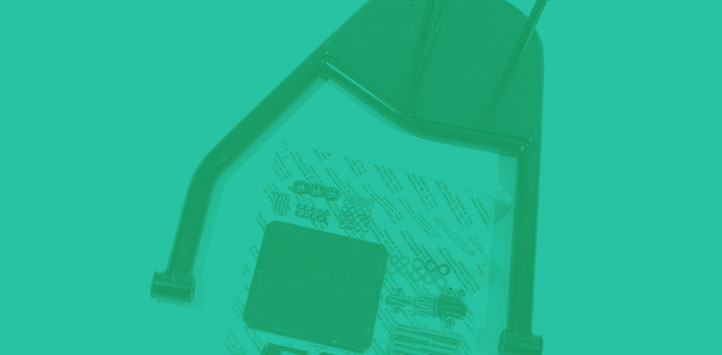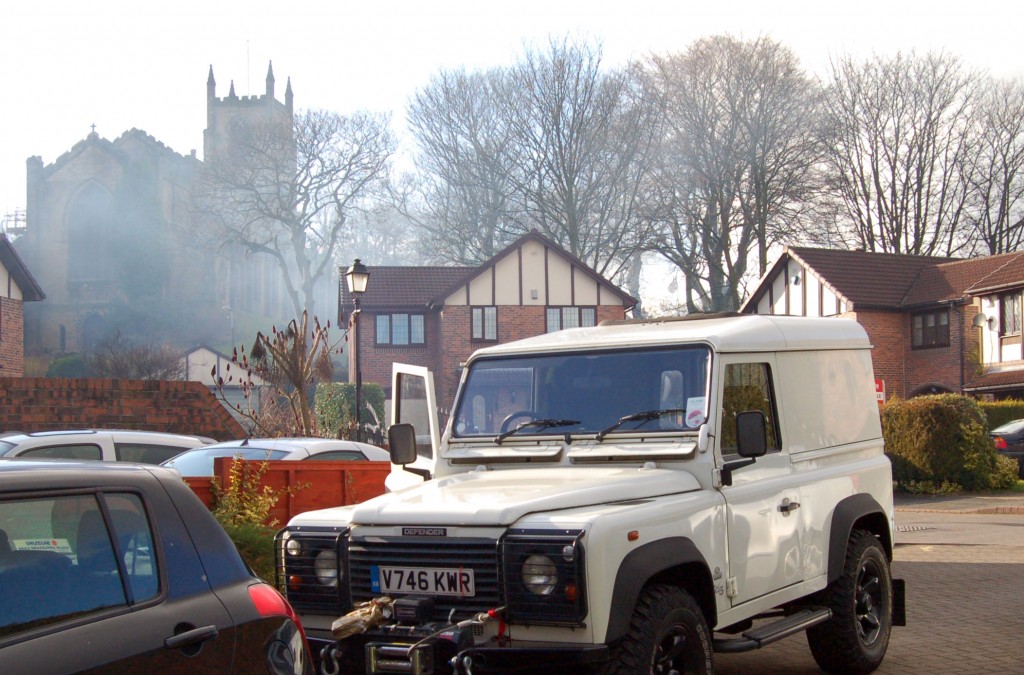
Ben Gribbin
February 18, 2011
Search
Popular Articles
8 Almost Useless Land Rover Mods
11th June 2014
Updated: What Makes a Defender Iconic?
29th November 2011
We've had a whole host of parts be delivered to FunRover HQ and we're working through bolting them on. One of the highest priority items was a good quality swing away wheel carrier. For those of you who are not familiar with these, essentially, they allow for practical positioning of the spare wheel, right out on the back of the rear door, acting as an additional support that moves with the door. The swing away carrier takes all the load of the wheel, so the door doesn't. Land Rover offer their very own rear door wheel mount, but this physically mounts to the door and is known to apply extra stress to the hinges. It's also quite precarious for use with larger and heavier aftermarket wheels, such as the KN Predators and 265 STT's we use. To give us a safe and strong mounting place for the wheel, we ordered a Bearmach Swingaway wheel carrier (available for Series Land Rovers through to the latest TDCI models).
Updated with more pics of individual components.
Features
- Chassis / Body mounted to reduce strain on door hinges & door
- Greasable
- Opens with rear door (door can be fully opened, even with light guards on and over-sized wheels / tyres)
- Available for 90/110 Defender models 1983-2002, 2002 onwards (will not fit soft top models or vehicles with NAS spec lights)
- Includes all fittings and instructions
Island 4x4
We ordered our Swingaway arm from Island 4x4, who we have to say have been the most impressive company we have dealt with since owning the Landy or starting this blog. The order was placed one rainy Saturday morning, it was dispatched on Monday and received the very next day. This is no small parcel and the best part was how Island 4x4 keep you throughly informed of your order's progress. Expect to receive multiple emails and texts as to the status of your package. We even received a text from the company detailing the hour we could expect the parcel to arrive. It arrived within 15 minutes of it's slot, which is great as you can't spend half your life waiting in for parcels. These guys are absolutely brilliant, we'll be using them again in the future when ordering more review products without a doubt. They were also pretty competitive on the pricing (postage was free!), do check them out @Island4x4.
What's included?
Included in the rather large box is the swingaway arm piece, the two body / chassis hinged brackets, the bump-stop (which is a critical piece), mounts for the door and strengthening plates, as well as all nuts, bolts and washers required to complete assembly. There's also a fitting guide, which we'll come onto shortly. All parts were shrink wrapped and accounted for. Make sure to give the packet a brief inspection first, just in case any parts are missing, as Bearmach state if the rear seal of the package is broken, they cannot accept missing parts requests. All-in-all, it's a very complete package.
Fitting
The old, standard Land Rover wheel holder Bottom right, note the handle that needs removing from the cross member.
Fitting parts to your Land Rover is the ultimate weekend pleasure (or toil for those less mechanically inclined). We happen to be members of the former, so the thought of fitting parts to the Defender is exciting to say the least. Even in near zero degree temperatures and pouring rain, (which is not reflected in the photo taken before the rain) we set about modifying.
Step 1: Lower Bracket
You are then free to get the socket set out. Attaching these bolts did take a bit of shuffling around as they are awkwardly placed and the rear cross member has an interior wall that you have to contort your arm around. Eventually we worked out a system of placing the nut on the rear side of the cross member, then carefully sliding it along the surface till it was in place. The gap here is so tight, that in order to get your spanner in, you need to start with the furthest bolt, then add each one in sequence. Our spanner also happened to be just slightly too long and it was all too easy to drop it, but balancing the other end on your thumb may help here. Anyway, after several dropped nuts, into the gungy goo that collects inside the cross member, the rear bracket was in place.
Part way through removing the screws (this took the longest and we didn't even need these holes, but it looks a lot tidier and will mean we can properly WaxOil this area when we get round to it)
More drilling, after this we moved on to widening the 3 holes that actually needed for mounting the bracket to. These are opened up from 8mm to 10mm for the M10 bolts used.
Step 2: Top Bracket
Our top bracket literally drilled straight through one of the body capping rivets (do triple check proper alignment though, the top and lower hinges must be exactly vertically aligned).
Now it's time to attach the arm to this piece, as you use the positioning of the arm to ascertain the top mounts position. In our case, it actually ended up drilling through the body cap rivet.
The bump stop can be seen here on the right nearest the camera. This part is crucial for the operation of the arm. The arm running centre is what takes up the slack between the door and arm as it opens (and adjusts for slightly different opening arcs).
Both brackets are adjustable, so do spend a little time tweaking to get things just right. Once the top hinge is in place, it needs to be vertically above the lower one, otherwise this can hamper the swingaway effect. So far it's taken maybe 15 minutes, give or take thanks to the quirky cross member. Until the arms are properly attached, it's a good idea to get a pal to hold the arm while you put the bolts in, just in case it stretches or strains the assembly. Once the top hinge is in, the manual says you can now let it swing on it's own, which is handy and less cumbersome. The next step is to remove the trim from within the cab (you may have already had to remove the county spec trim from behind the rear quarter panel.
The entire rear door card / trim piece also needs to come off, as you have a large strengthening plate to fit here. The manual is quite vague about how to go about this, so through a process of experimenting, we mounted ours as follows. We attached the short arm that mounts to the swing arm and the door plate. We also bolted on the plate mount and hinge, then applied some of that horrible yellow grease to the mount. We extended the whole assembly so that it laid as flat as possible (it will have a slight angle away from the car when viewed from above according to instructions). Then we simply pressed down. T
his gave us a clear marker for our first hole, which was drilled (after bolting the strengthening base plate on). Once one hole was in, you can use the mounts other bolt holes to drill through. We did have a horrible moment when we then threw the wheel on, only to realize it wouldn't open! That was because we forgot to fit the bump stop, which quite literally makes the whole assembly work. It takes up the slack in the trailing arm and stops the wheel from flapping backwards and forwards. Getting this to work just right took a few moments, but once it was in place, the whole assembly swings perfectly. It definitely makes the door a lot easier to open too, which is a plus as some smaller passengers found this hard if parked pointing down hill.
The whole thing opens and shuts perfectly now and you find yourself grimacing less when off-roading or hitting pot holes as the rear door used to actually wobble about. Fitting the wheel to a proper carrier is much safer for pedestrians and fellow road users, it looks so much better and is very hear-wearing.
The only problem you may have is the wheel seems to have raised up a few inches compared to the Land Rover door carrier, however, if you didn't have this fitted before, you'd probably never notice. A highly recommended addition for any Land Rover owner looking for a secure and smart place to store their spares.
Related items for sale on eBay
| Ebay has returned a malformed xml response. This could be due to testing or a bug in the RSS2 Generator. Please check the support forums to see if there are any posts regarding recent RSS2 Generator bugs. CURL error code = 6. (Could not resolve host: rest.ebay.com) |
About Us
FunRover is a place for Land Rover enthusiasts to gather as a community and discuss the best 4x4 vehicles ever produced. We're building a library of high quality resources & articles to help owners along in their Land Rover ownership.
Popular Posts
8 Almost Useless Land Rover Mods
11th June 2014
Updated: What Makes a Defender Iconic?
29th November 2011
How to Plastidip your Land Rover Defender
19th August 2014




















